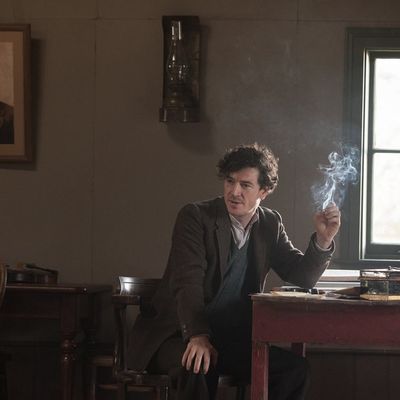
Ken Loach’s new film starts off with archival footage of New York City in the 1920s — dense, concrete skylines, the streets awash with people, bread lines, homeless men sleeping in the streets, urban vitality giving way to urban despair. Then it slams right out of that opening credits sequence into a verdant expanse of road in rural Ireland. The immediate effect is one of relief, like someone just allowed us a deep breath of fresh air. An ironic way to kick off a story that’s all about running away and liberation and the looming presence of the past. Also, perhaps, an ironic way to start off a movie that’s more Footloose than The Wind That Shakes the Barley. But more on that in a bit.
Jimmy’s Hall tells the story of Irish activist Jimmy Gralton (Barry Ward), who fled his wartorn country for America in the 1920s. It’s now 1932, the world is in the midst of the Depression, Ireland is struggling with an uneasy peace, and Jimmy has returned to County Leitrim to help his aging mom with the family farm. He’s a man with a past, as they say: His fellow villagers regard him with a mix of curiosity and fondness, but there’s a hint of anticipated mischief as well. The conservative parish priest, Father Sheridan (Jim Norton), worries that Jimmy will stir up trouble again, and even deviously offers to find him a job in London. Meanwhile, Oonagh (Simone Kirby), the woman Jimmy loved, went off and married another man after he exited the picture, but there’s clearly still a spark between them.
The real Jimmy Gralton was a Marxist revolutionary, reportedly the only Irish citizen ever deported from his own country. But Loach and his screenwriter Paul Laverty downplay the more fiery aspects of his persona to focus on Jimmy’s main legacy to the people around him: a community center constructed on his land, with his money, and using the help of local townsfolk. A large, nondescript space, the now-abandoned Pearse-Connolly Hall offered a sanctuary far from the prying eyes of the church and the authorities — “the masters and the pastors” — where common folk could hold dances, read poetry, learn to paint, box, you name it. Simple endeavors, perhaps, but important ones in this heavily regimented, suspicious society — a direct challenge to the Church’s role as the arbiter of one’s existence.
Running into a group of young men and women dancing by themselves in the middle of the road, Jimmy is immediately pressed to reopen the old hall. He doesn’t need a lot of convincing: The place holds memories for him as well. As Loach intercuts between the efforts to revive the hall now and what happened there a decade ago, he makes the personal political and vice versa. For Jimmy, the memory of his beloved Oonagh teaching a dancing class becomes as much an act of revolution as any screed or manifesto. Father Sheridan understands this as well. For him, the sight of men and women consorting together (and now, in the hall’s new iteration, they can even do such sinful foreign dances as the Lindy hop) is a moral and political outrage — the thin end of the wedge of revolution. So he casts his lot with the local tenpenny fascists to put an end to Jimmy’s activities.
Don’t let the politics scare you off, though, for Jimmy’s Hall is a joyous movie. I wasn’t being glib with that earlier mention of Footloose: Loach’s film isn’t technically a musical, but it has that same spirit, that same let’s-put-on-a-show vitality. Even its politics come from that world: In its juxtaposition of stodgy, slightly daft conservatism with communal glee and celebration, this isn’t a nuanced, sober work. It’s a film that stacks the deck ideologically, but does so with such energy and freewheeling charm that you roll with it. That’s sort of the point, too — the way to liberate a mind, Loach argues, is through passion. One girl, the daughter of a hardheaded local militia member, takes the lead in getting Jimmy to reopen the hall. Later, she bears the brunt of her authoritarian father’s fury, but she comes right back to the hall, battered and bruised, to keep dancing.
Loach’s career has been a monumental one — there are few directors better at observing the simple reality of human existence, and finding poetry in it — but his work can sometimes run the risk of political grandstanding. Jimmy’s Hall, despite its loaded subject matter, avoids that fate, however. Loach and Laverty do simplify great political debates, but they do so with humor and warmth. At one point, we see Father Sheridan arguing over breakfast with a younger priest about whether to go after Jimmy and his hall. “Probably best to ignore it,” the younger priest says, quite reasonably. “Repression breeds belligerence.” Sheridan, however, isn’t having any of it. He snidely quotes Karl Marx, then observes, “The language of brotherhood, it spreads like wildfire in a world of rampant greed” — perhaps not fully aware of the fact that he could easily be speaking of Christianity itself. This is agitprop, but it’s a very gentle kind of agitprop, all aglow with generosity and detail. In that scene, we sense the younger priest’s skittishness as he tries to keep the older priest from doing something rash; we notice the latter looking around for marmalade as he smugly makes his point. These men may be mouthpieces, but they’re mouthpieces who are very much present before our eyes. Jimmy’s Hall may be a simple movie about a complicated subject, but it wins us over honestly.


